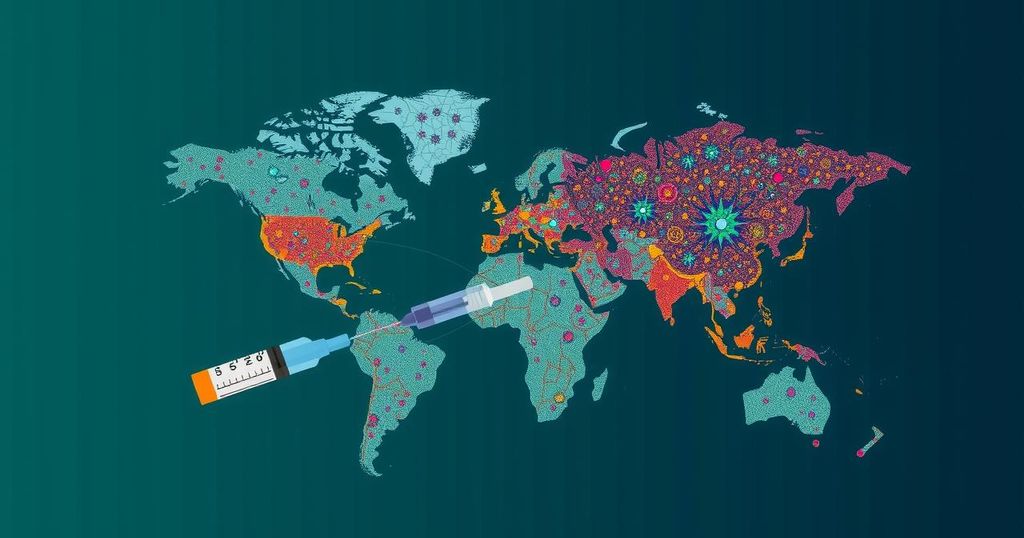Climate change
AFRICA, AFRICA CENTRES FOR DISEASE CONTROL AND PREVENTION, CHANGE, CLIMATE, CLIMATE CHANGE, COLOMBIA, CUBA, DEPARTMENT OF HEALTH AND HUMAN SERVICES, DONALD TRUMP, FLORIDA, GLOBAL WARMING, GREENHOUSE GAS EMISSIONS, HELENE, INSIDE CLIMATE NEWS, MILTON, NORTH AMERICA, PUERTO RICO, ROBERT F. KENNEDY JR, SCIENCE, SOUTH AMERICA, WHO
Isaac Bennett
0 Comments
The Impact of Climate Change on Vaccination Efforts and Public Health
Climate change is reshaping disease dynamics, leading to increased outbreaks and undermining vaccine efficacy. It fosters conditions for pathogens like cholera and dengue to thrive while complicating vaccine distribution due to extreme weather events. Rising vaccine hesitancy, influenced by misinformation and political rhetoric, poses additional threats to public health during this critical time. Very effective public health strategies must emerge to mitigate these compounding issues.
Climate change is significantly transforming the global landscape of diseases, creating favorable conditions for illnesses to proliferate in new regions. Concurrently, it is undermining the efficacy of vaccination efforts, which have historically played a pivotal role in safeguarding public health. The World Health Organization estimates that over 154 million lives have been preserved through global immunization initiatives over the last fifty years. However, extreme weather events induced by climate change are liable to hamper vaccine distribution, degrade their effectiveness, and jeopardize vaccine supplies.
Furthermore, there exists a parallel rise in vaccine hesitancy, exacerbated by the COVID-19 pandemic, leading individuals to question the safety and importance of vaccinations. This skepticism is further fueled by misleading rhetoric from some politicians, notably Robert F. Kennedy Jr., who has been associated with anti-vaccine sentiments. These factors collectively pose a profound threat to public health, particularly in a climate increasingly conducive to disease outbreaks.
Regions susceptible to climate-driven health crises face heightened risks, particularly low-income nations. The WHO has observed a notable increase in cholera incidences worldwide, highlighting the repercussions of climate change on disease spread. Major flooding exacerbated by climatic shifts has facilitated the proliferation of cholera bacteria in contaminated water sources. Jean Kaseya, Director General of the Africa Centres for Disease Control and Prevention, clearly articulated this pressing concern, stating, “Cholera in Africa is a climate change issue.” Research indicates that climate change may aggravate over half of the known human pathogenic diseases, including dengue and malaria, which could expand to previously unaffected territories in response to rising temperatures and altered precipitation patterns.
The relationship between climate change and vaccine efficacy is also becoming evident. Vaccines, particularly those requiring stringent storage conditions, are vulnerable to degradation from increased heat and improper handling during extreme weather events. It has been shown that adverse environmental conditions can impair an individual’s immune response to vaccines, further complicating public health efforts. Yongqun “Oliver” He, a professor at the University of Michigan Medical School, highlighted that extreme temperatures can negatively impact human immune responses to vaccinations.
Moreover, persistent misinformation about vaccines proliferates through social media, further diminishing public trust and acceptance. Political leaders, notably those aligned with anti-vaccine narratives, have capitalized on these misconceptions for political gain, ultimately undermining the overall integrity of public health guidance and policies. Alessandro Siani, a researcher at the University of Portsmouth, emphasized that vaccine misinformation influences vaccine acceptance rates, complicating public health missions during a period heightened by climate change.
In summation, as climate change continues to reshape the infectious disease landscape, the importance of vaccines becomes increasingly pronounced. However, declining trust in vaccines, propagated by misinformation and political agendas, threatens to exacerbate public health vulnerabilities. Collaborative efforts between governments, health policymakers, and scientific communities are imperative in cultivating transparent, trustworthy dialogue regarding the benefits of vaccination in the context of climate change, thereby protecting public health at large.
The intersection of climate change and public health has become a topic of increasing concern, particularly regarding the spread of infectious diseases and the efficacy of vaccines. Climate change alters environmental conditions that facilitate the dissemination of pathogens, increasing outbreaks of diseases such as cholera and dengue fever. Concurrently, the effectiveness of vaccination programs is jeopardized by extreme weather events that can compromise vaccine stability and availability. With rising skepticism about vaccinations and increasing misinformation campaigns, particularly post-COVID-19 pandemic, public health initiatives face substantial challenges in maintaining immunization coverage. Understanding the challenges posed by climate change regarding both disease outbreaks and vaccine distribution is essential for developing effective public health strategies. The reality that climate change can lead to both an increase in disease prevalence and difficulties in vaccination deployment is alarming, particularly for regions already experiencing vulnerabilities due to socio-economic disparities. This situation necessitates an urgent reevaluation of public health approaches.
The implications of climate change extend far beyond environmental degradation, encompassing significant threats to public health through altered disease patterns and compromised vaccine efficacy. The confluence of increasing disease outbreaks and declining public confidence in vaccines necessitates immediate action from health authorities and policymakers to counter misinformation and foster trust in vaccinated communities. Enhanced transparency and accountability in public health communications will be critical in navigating the intersection of climate change and vaccine acceptance, ultimately promoting the wellbeing of populations worldwide.
Original Source: www.nationalobserver.com




Post Comment